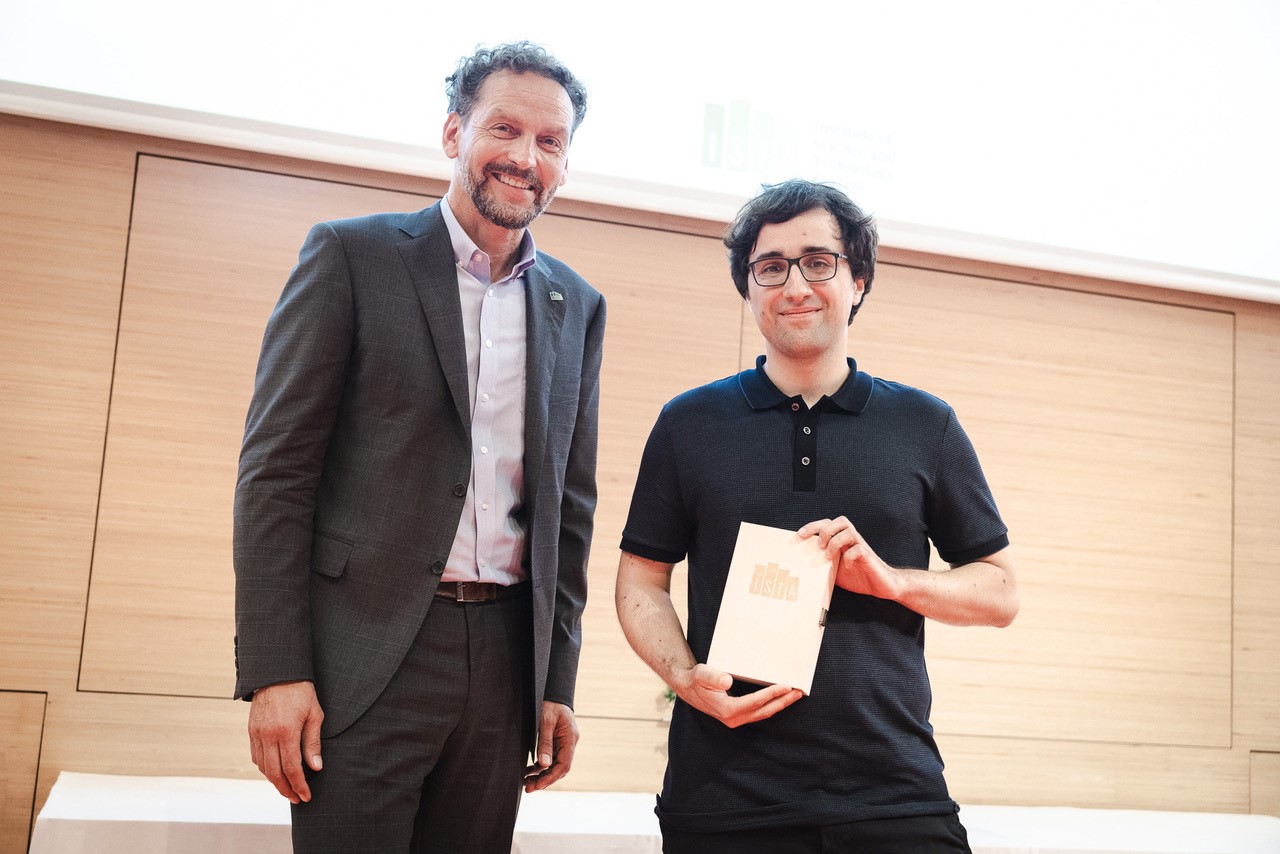
The ISTA Alumni Award 2023, given to excellent former ISTA researchers, was presented during the Graduation Ceremony of the ISTA Graduate School at the end of June. Awardee Alexander Kolesnikov is a great example of what the future can hold for excellent PhD students after graduating from ISTA: he received his doctorate in 2018, is currently working at Google Research in Zurich.
Already during his PhD, Kolesnikov focused on the design of computer systems that can automatically learn to parse and understand visual information, like images or videos. “The crux of my research lies in enhancing the efficiency with which computers learn to interpret visual data from examples,” Kolesnikov explains. What he has begun at ISTA’s Lampert group focusing on machine learning and computer vision, he is still pursuing at Google now—and that very successfully, as his former supervisor Christoph Lampert points out: “Not even five years after his PhD, Alexander has become a highly cited scholar in his field. He has made an astonishing number of influential contributions to computer vision, most notably the creation of machine learning algorithms, so called Vision Transformers. These have now become the foundation of most state-of-the-art computer vision models, both academic and well as commercial.”
This is one of the many reasons making Kolesnikov a worthy winner of the alumni award, which he received at the ceremony this Thursday. And the appreciation clearly is mutual. “I am deeply honored to receive the ISTA Alumni Award,” Kolesnikov said. “This recognition holds special significance for me, as ISTA has played a pivotal role in shaping me as a scientist.”
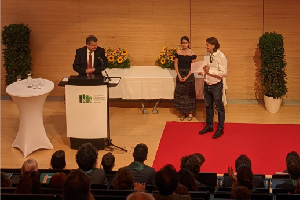
For the first time, ISTA presented an outstanding achievement award to an alumnus. The ISTA Alumni Award went to former ISTA postdoc Anton Mellit, an outstanding mathematician who, according to his former group leader Prof. Tamas Hausel, “works in four to five different areas of mathematics simultaneously and achieves extraordinary success.” The Ukrainian is currently an associate professor at the University of Vienna and has gained international attention for his work on knot theory, algebraic combinatorics, algebraic geometry, and number theory.
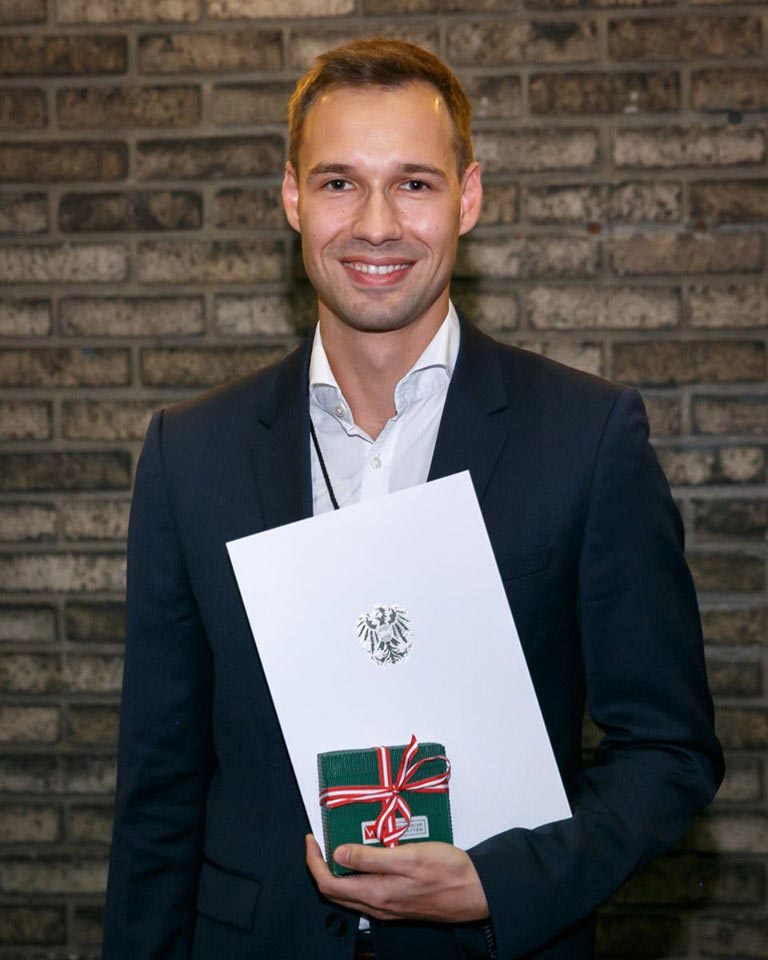
Congratulations to IST Austria alumnus Johannes Reiter, who has been awarded the Young Scientist Award by the Austrian Scientists & Scholars in North America (ASCINA)! Nowadays, Johannes is leading his group at Stanford ‘Translational Cancer Evolution Laboratory’!
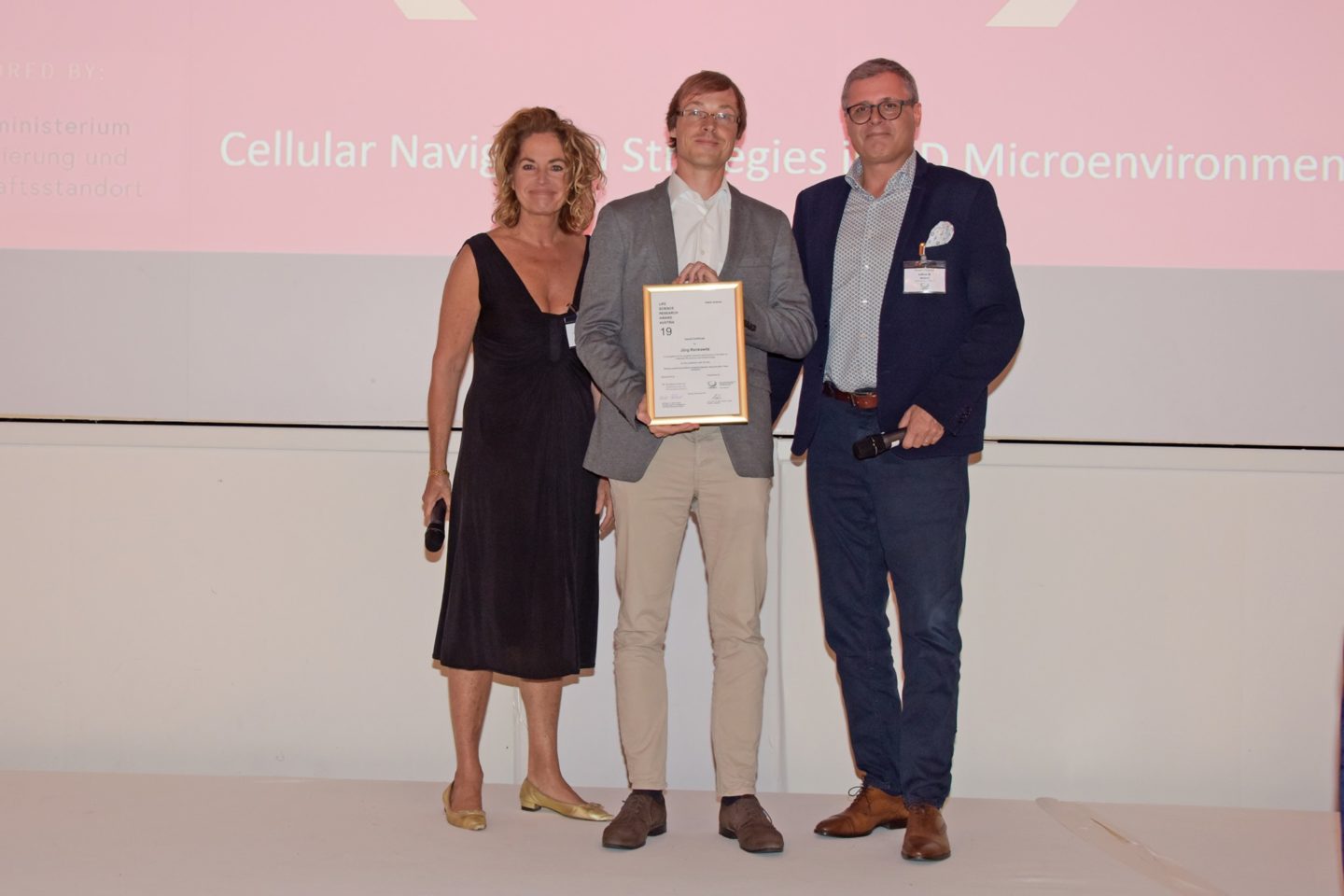
Congratulations to Jörg Renkawitz, former ISTAustria postdoc in Professor Michael Sixt’s group, who has won the Life Science Research Awards Austria 2019 by the Austrian Association of Molecular Life Sciences and Biotechnology for his research paper on ‘Nuclear positioning facilitates amoeboid migration along the path of least resistance’, which was published while Jörg was at IST Austria.
💬‘Thanks to IST Austria, Michael Sixt and the Sixt lab for the great time at IST Austria! Since finishing my postdoc at IST Austria I have started my own group at Biomedical Center Munich (BMC) where I aim to discover cell biological principles employed by immune cells!’ – Jörg Renkawitz
Check out the paper here: rdcu.be/buvS0
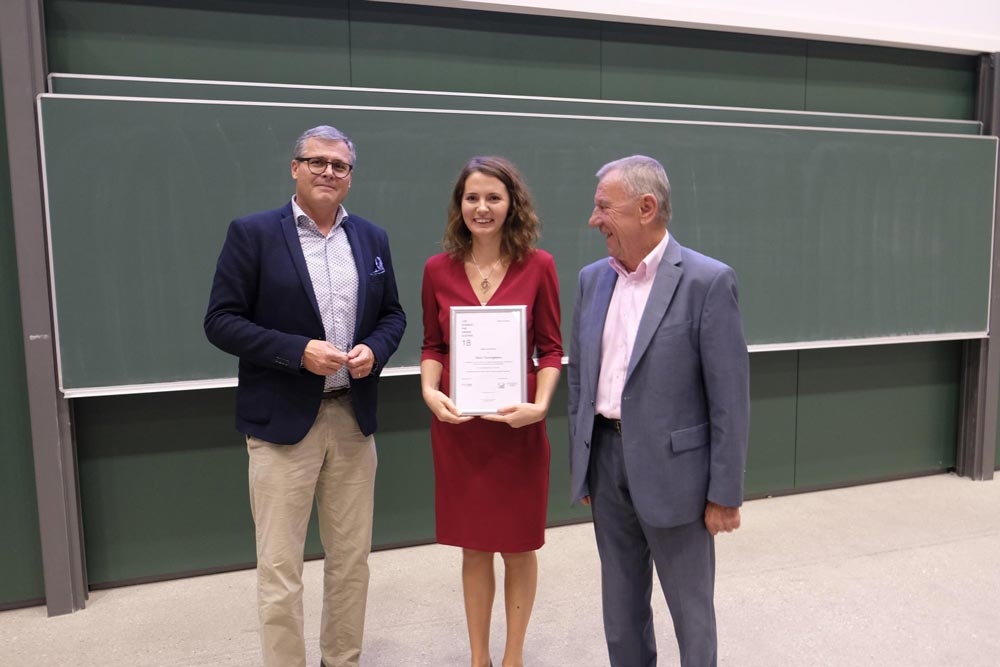
Former PhD Student Dora Tarlungeanu received a Life Science PhD Award Austria 2018 for her dissertation. Funded by Polymun Scientific and THP Medical Products, the annual prizes are granted by the Austrian Association of Molecular Life Sciences and Biotechnology (ÖGMBT) for excellent PhD theses in basic and applied science. The award ceremony was held at the 10th ÖGMBT Annual Meeting last month in Vienna and was followed by Dora’s ÖGMBT Lecture on “The Branched Chain Amino Acids in Autism Spectrum Disorders”.
More information at https://www.oegmbt.at/preise/dissertationspreise
The IST Alumni duckies have arrived. From now on everyone finishing the PhD at IST Austria can pick up one of these cute duckies from the alumni office.
Also if you already have a PhD from IST and you would like to have a duckie give me a shout!
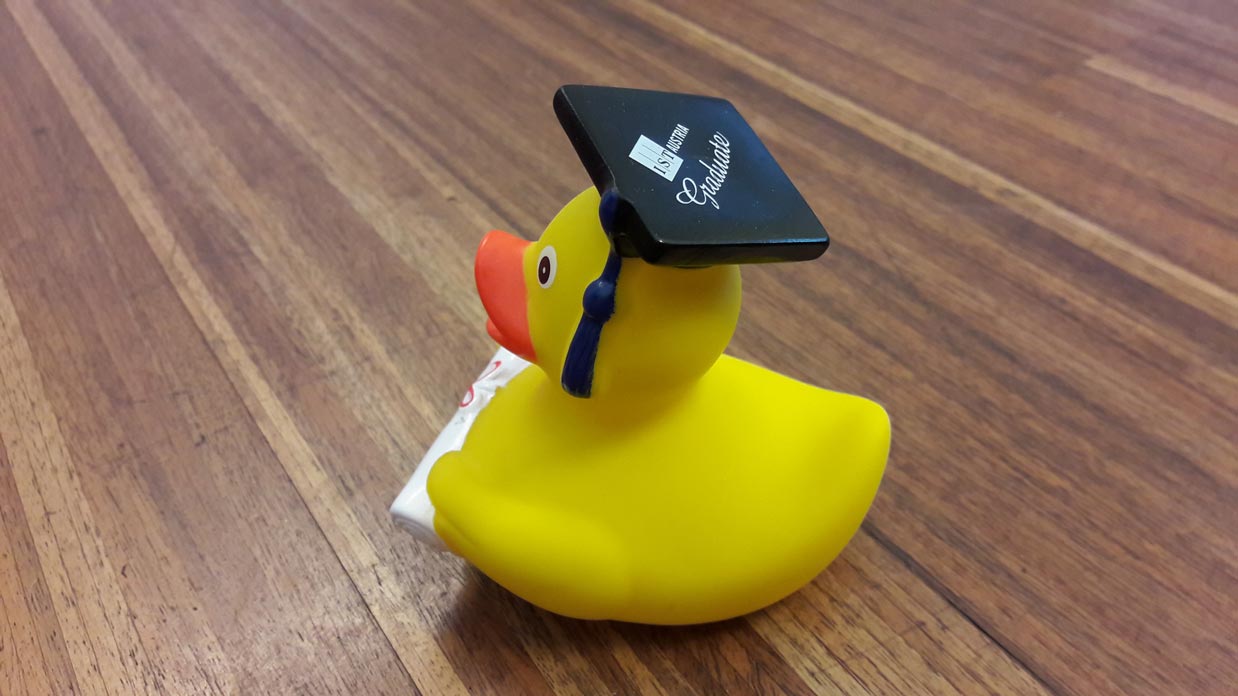
If you are a postdoc alumni we have a present for you too! Please come by the alumni office for your farewell interview and pick up your IST alumni flashlight!
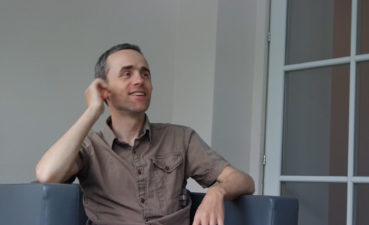
When designers select a method for simulating water and waves, they have to choose either fast computation or realistic effects; state-of-the-art methods are only able to optimize one or the other. Now, a method developed by researchers at the Institute of Science and Technology Austria (IST Austria) and NVIDIA bridges this gap. More
Part of the team of NVIDIA is also Stefan Jeschke an IST Austria alumnus. Even after leaving IST Austria he didn’t lose his connection to IST Austria he even staid on campus and rented an office here. You can read about how he works remotely for NVIDIA and how is connection to IST Austria works in Stefan Jeschkes alumni story.
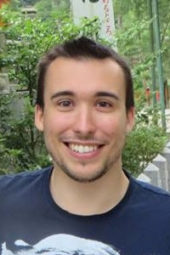
Last weekend, during the Symposium Diskrete Mathematik (hosted by TU Graz), Isaac Mabillard (alumnus of the Wagner Group) was awarded the prestigious Richard Rado Prize.
“The prize is awarded every two years by the Fachgruppe Diskrete Mathematik of the German Mathematical Society (DMV) for outstanding dissertations in Discrete Mathematics. The prize is sponsored by Springer-Verlag and this time is endowed with 1000 EUR.”
For further details about the prize and about the award ceremony (incl. photos of the event and the laudation of Isaac), please see the following website:
https://www.math.tugraz.at/comb/sdm2018/index.php?link=radoprizeresult

IST Austria added an alumni section to its LinkedIn profile! So if you want to find out more about the career paths of our Graduate School alumni, just got to the professional networking platform at goo.gl/VN5wyA
By the way, you as an IST Austria alumna/us can help make our alumni section a success by opening your LinkedIn profile and providing information on your studies and skills. Thanks, guys!
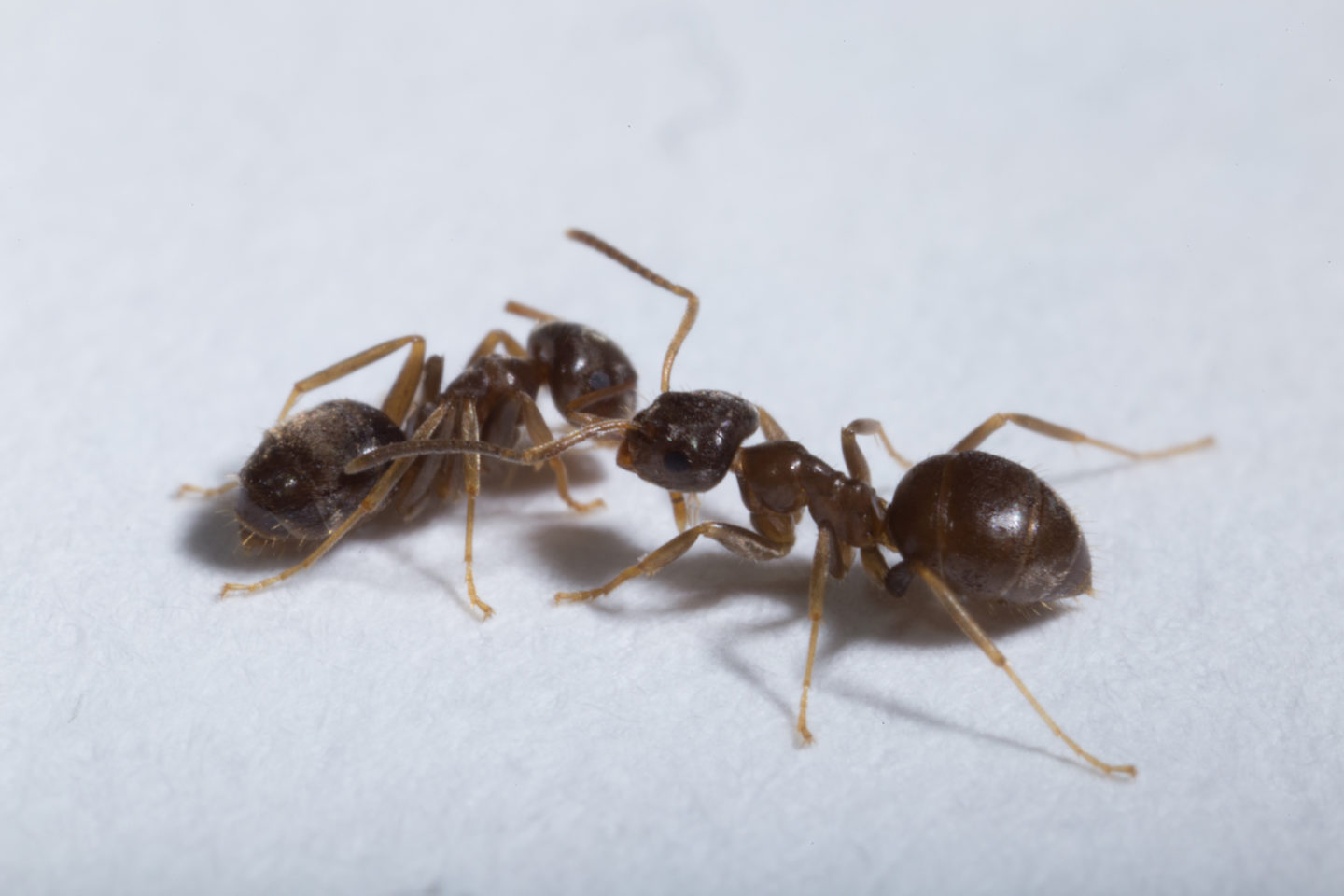
IST Austria alumnus Christopher Pull was interviewed for episode 45 of the eLife podcast. At the invitation of The Naked Scientists, he talked about “No mercy for sick ants”. In a recent eLife paper, Sylvia Cremer’s group had found out that ants kill colony mates infected with deadly diseases when they are unable to prevent them from falling sick in the first place. In doing so, the ants protect their colony from the outbreak of an epidemic. When fighting diseases, ant colonies show a remarkable similarity with the immune system that protects the organism of vertebrate animals. Christopher Pull was a PhD student in the Cremer group at IST Austria from 2012 to 2017. He is now a postdoctoral researcher at Royal Holloway, University of London.
Check out the podcast and paper at https://elifesciences.org/podcast/episode45